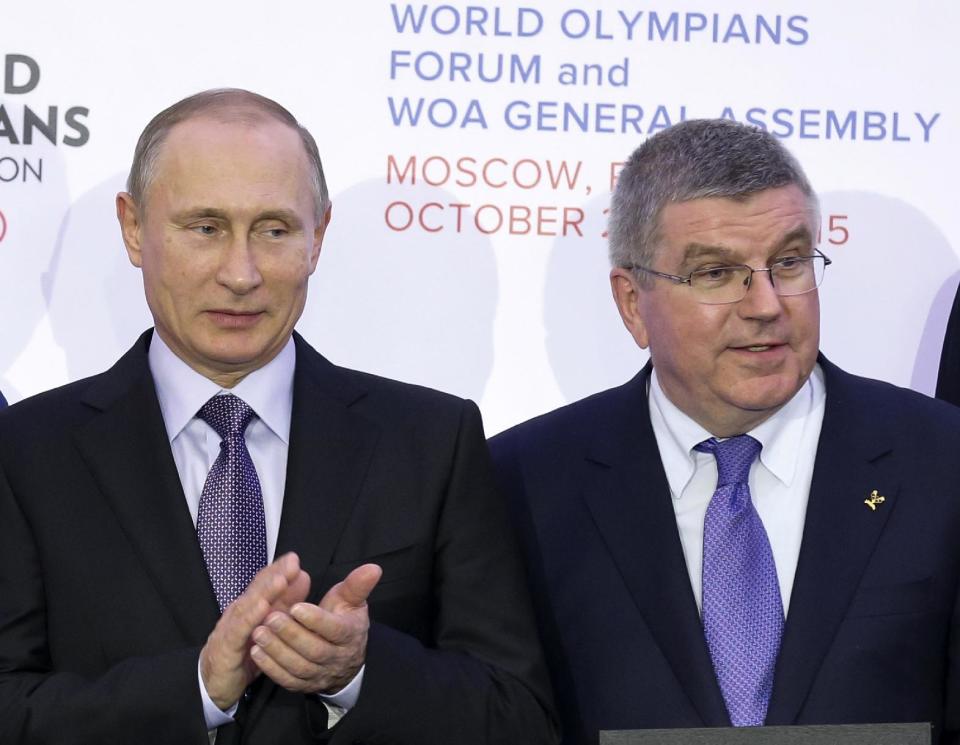If the Russian doping scandal doesn't warrant an Olympic ban, what would?
It’s not just the widespread doping. It’s not just the cover-up of the widespread doping. It’s not just the systemic, state-run cover-up of the widespread doping. It’s the brazenness of it all – the undermining of the spirit of the Olympics. That’s what was most disturbing about Monday’s World Anti-Doping Agency Report on Russian doping at the Olympics and beyond. That’s what the International Olympic Committee must punish – not only with a ban from the 2016 Games in Rio, but also the threat of a ban for the 2018 Winter Olympics as well.
The doping allegations spanned 28 sports and covered up 312 Olympic tests, involving “Russian athletes from the vast majority of summer and winter Olympic sports,” according to Richard McLaren, the Canadian lawyer who authored the report. That’s both summer and winter sports, from track to curling to table tennis. Urine samples were subbed out. Dirty samples were passed through a “mouse hole” from a laboratory to an “operations” room. “With the plan’s linchpin in place,” the report reads, “the hijacking of the Sochi Games could go on unobstructed by international observers and any interference.”
A WADA operations official was reportedly put under Russian surveillance so if he happened to wander toward the scene of the ongoing crime, the perpetrators “would be forewarned.” And if all that wasn’t enough, one Russian security official was, according to McLaren, allowed “access to the Laboratory as an accredited persons under the cover of being a sewage and plumbing employee of the building service maintenance contractor.”
It’s enough to elicit memes and jokes – Soviet-era sabotage modernized via drill and plunger – but it’s utterly serious to the athletes who trained for a lifetime only to lose medals to Russian corruption. There is no punishment that can bring back their chance – no penalty that can undo their anger.
WADA recommended a ban on the Russians for Rio, releasing a statement including this passage:
“Given that the Russian Ministry of Sport orchestrated systematic cheating of Russian athletes to subvert the doping control process; and that, the evidence shows such subversion in 30 sports, including 20 Olympic summer sports and Paralympic sports, the presumption of innocence of athletes in these sports, and in all Russian sports, is seriously called into question.”

That’s the lingering, festering problem: Who knows which Russians cheated and which didn’t? It may seem unfair to ban an entire delegation from an Olympics, but “innocent until proven guilty” seems unsustainable in this instance. The Russians are not simply accused of subbing in an athlete’s clean urine, but any clean urine they could find from any athlete. If the entire apparatus was dirty, then what steps can be taken now, three weeks from the Rio Games, to ensure that the Russian culture has improved? The “Disappearing Positive Methodology,” as McLaren called it, was used on 643 positive samples, per the report, and that was “only a minimum.”
There is a way for individual Russian athletes to participate going forward: prove themselves clean via non-Russian, internationally-approved testing. Two track athletes have already done this, and the rest should be allowed the chance in the coming weeks, months and years. But the Russian flag should not appear in Rio, and there should be a probationary period extending through 2018. This can’t be regarded as urine under the bridge.
Here’s another way to look at the IOC’s decision: If this doesn’t warrant a ban of an entire delegation, what would? What could a nation do that’s beyond the scope of this kind of shady operation?
A severe punishment wouldn’t be only for discipline, but also for precedent. Science will always outpace testing, so the Olympics will never be rid of cheating. Part of the need is for a threat of harsh punishment for those who are caught. If clean athletes are concerned about paying a price for dirty countrymen, they are somewhat more likely to blow the whistle. This holds true for Russia as well as for every other competing nation. Although what McLaren found here is beyond the pale, it’s silly to think that cheating isn’t a problem around the world.
“The current anti-doping system is broken,” USOC CEO Scott Blackmun said in a statement. He called on the IOC to “impose sanctions that are appropriate in relation to the magnitude of these offenses, and that give clean athletes some measure of comfort that they will be competing on a level playing field in Rio.”
What will the IOC do? If it really wants to protect the Olympic movement, it will punish harshly and with an eye toward the future of the Games rather than the immediate present. The legacy of the Sochi Games is tarnished, and Rio is now at stake as well.
It’s fair to say the legitimacy of all future Olympic Games hang in the balance.
“Should there be evidence of an organized system contaminating other sports [besides track],” wrote IOC president Thomas Bach in an op-ed for USA Today, “the International Federations and the IOC would have to make the difficult decision between collective responsibility and individual justice.”
Truly, in this case, there’s no way to help the cause of individual justice without upholding collective responsibility.


